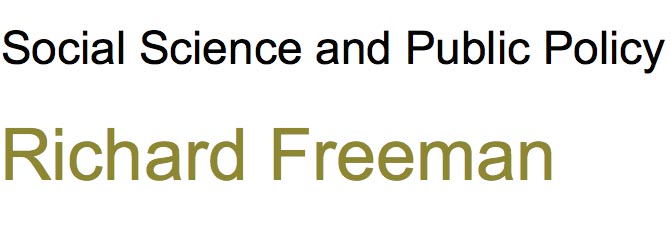‘Aaron, why only sometimes?’
pointed to the relevance of Wildavsky’s work for practice-based approaches to policy studies… The paper, given to the Interpretive Policy Analysis conference in Tilburg in July 2012, began by citing a passage from Craftways: ‘The imposition of order...Knowledge in Policy: embodied, inscribed, enacted
Knowledge in Policy is contracted to appear in late 2013, edited by Richard Freeman and Steve Sturdy and published by Policy Press… Knowledge in Policy: embodied, inscribed, enacted introduces a new way of thinking about knowledge, not in terms of its content or...Teaching practice
was a panel led by Richard Freeman and David Laws at the IPA conference in Tilburg… The turn to practice represents an exciting new agenda for policy research that stands many conventions on their heads. But how might it impact on our teaching? This seminar will...Stefanie Schmachtel
worked on a method of practice-based comparison for a project on local governance in education, and now teaches at the University of Jena.Martina Karels
studied and worked in theatre in New York, and wrote her thesis on the production and performance of public memory at Ground Zero.Teaching practice
was a panel led by Richard Freeman and David Laws at the IPA conference in Tilburg… The turn to practice represents an exciting new agenda for policy research that stands many conventions on their heads. But how might it impact on our teaching? This seminar will...Arno Simons
was Research Associate in the Innovation in Governance Research Group at the Technische Universität in Berlin, investigating the emergence and consolidation of emissions trading through networks of documents.Rhizomic regulation: mobilising knowledge for mental health in Europe
Regulation depends fundamentally upon the production and dissemination of knowledge. At a minimum, one might imagine a mechanical model of regulation which involves regulator A exerting control over the actions of actor B. But even here, knowledge is crucial, for B must know what kinds of actions A requires or considers appropriate if regulation is to occur.
Stakeholder consultation and social mobilization: framing Scottish mental health policy
Public and stakeholder consultation is increasingly important in the policy process, both in the UK and elsewhere. Social scientists have considered consultation primarily in terms of how it relates to decision-making – either as a means of involving a wider constituency of actors in the decision-making process, or as a means of legitimizing the decisions taken by policymakers.
Can I ask a question?
Sure, go ahead – use my email address at the bottom of the page. I’ll get back to you.Mabutho Shangase
worked in the Department of Health in Pretoria and then at the National Youth Commission before moving to the Independent Development Trust. His PhD was about ways of conceptualising policy making in South Africa.Mental health policy: ‘learning what we know’
Our work in the KNOWandPOL project described the process by which the mental health policy community in Scotland and in Europe comes to ‘know what it knows’; its potential value lies in helping that community to deploy its various knowledges both more...Reverb policy making in wave form
A new paper in Environment and Planning A explores how we might think of policy as something that moves
The practice of policy making
Editorial introduction to the special issue of Evidence and Policy 7 (2) The Practice of Policy Making. Source: Evidence and Policy 7 (2) 125-133 link SaveSaveKatherine Smith
held an ESRC/MRC Fellowship in 2011-2012, studying the translation of public health research into policy and practice, and is now Reader in the Global Public Health Unit, University of Edinburgh.Rosie Anderson
worked for the BBC and the Royal Society of Arts, and then as Policy and Research Manager for Community Matters in London. Her doctoral thesis was an ethnographic study of emotion in the policy work of a Scottish NGO.Nur Abdelkhaliq
studied the European Commission’s implementation of the external dimension of immigration policy. In 2009-2010, she was Research Assistant on the EC-funded project ‘Multilateralism and the EU in the Contemporary Global Order (MERCURY)’.Documents, practices and policy
What are the practices of policy making? In this paper, we seek to identify and understand them by attending to one of the principal artifacts – the document – through which they are organised.
Introduction
We are concerned here with community psychiatry, a particular way of knowing and thinking about mental illness and of responding to it. Community psychiatry, for our purposes, refers to all the policies, services, agencies and staff deployed in treating people with mental health problems who are poor and for whom publicly-funded services are the default, if not the only, option.
